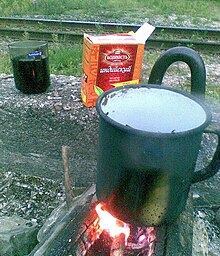
Chifir (Russian: чифи́рь, romanized: čifir', or alternatively, чифи́р) is an exceptionally strong tea, associated with and brewed in Soviet and post-Soviet detention facilities such as gulags and prisons.
Some sources mention properties of a light drug, causing addiction.
Etymology[edit]
The etymology is uncertain but is thought to come from the word chikhir' (чихирь) meaning a strong Caucasian wine, or a Siberian word for wine that has gone off and become sour and acidic.[1]
Preparation[edit]
Chifir is typically prepared with 5–8 tablespoons (50–100 ml) of loose tea (or tea bags) per person poured on top of the boiled water. [citation needed] It is brewed without stirring – at least until the leaves drop to the bottom of the cup.[citation needed] During the brewing process, the leaves start to release adenine and guanine into the water, which does not happen during traditional tea-making.[citation needed] Sugar is sometimes added; the nature of the brew tends to result in a bitter flavor.[2]
It is to be carefully sipped, otherwise it may cause vomiting.[citation needed] Ultimately, making chifir involves brewing a great deal of black tea and for a long time. It may be left to brew overnight and drunk either hot or cold.
In popular culture[edit]
- Irina Ratushinskaya describes the brewing of narcotically strong chifir as a banned activity sometimes undertaken by prisoners, in her memoir of her years as a political prisoner, Grey Is The Colour Of Hope.
- In Vasily Aksyonov's novel Ozhog ('The Burn'), the convict Shilo makes chifir in a tushonka tin and gives it to Tolya von Steinbock. Tolya falls into a blissful, dreamlike state, but is awake enough to overhear an escape plan being hatched.
- In the Gabriele Salvatores-directed film Deadly Code, the character played by John Malkovich prepares and describes chifir to the young Kolyma
- In the novel Gorky Park by Martin Cruz Smith (1981) the main character Arkady Renko drinks chifir on a train with workers on their way to a work camp.
- Several characters drink chifir in The Kolyma Tales, a collection of short stories about Gulag life by former Gulag prisoner Varlam Shalamov.
- In Jules Verne's novel In Search of the Castaways when the heroes visit Australia, Paganel requests tea made according to local custom, and is served a drink made by boiling half a pound of tea in a litre of water for four hours. Shalamov mentions this in his aforementioned stories to demonstrate chifir' is not a new invention.
- In the book series Ciaphas Cain, many characters drink a version of Chifir called Tanna.
See also[edit]
- Sa'idi tea, a somewhat similar beverage (essentially a weaker grade, but consumed in larger quantities) drunk in Upper Egypt and among Sa'idi people elsewhere
- Zavarka, concentrated tea used in brewing tea from a Samovar
References[edit]
- ^ Чифирь (in Russian)
- ^ Чай, чифирь, купец (in Russian)